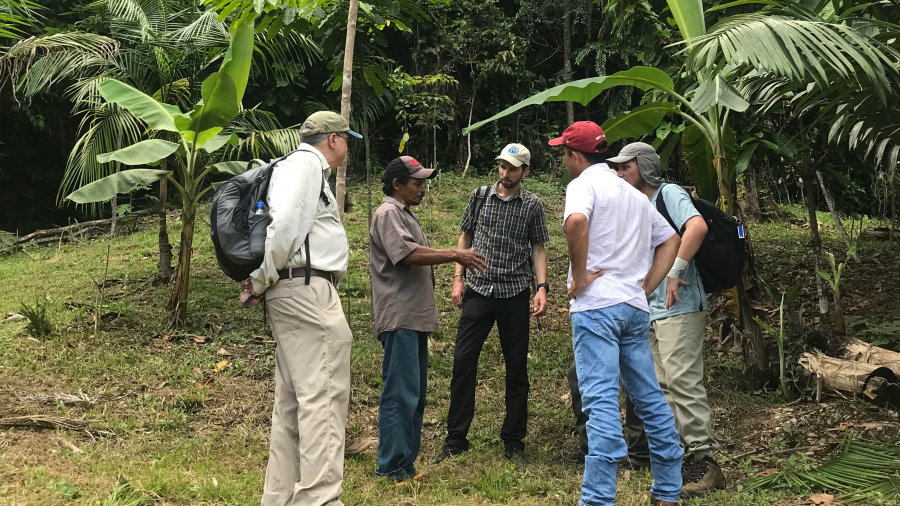
Photo credit: Peter Newton
A downloadable version of this explainer is available here:
Convergent research is research that has societal relevance, leads to outcomes that are useful (i.e., actionable), and requires integrative interdisciplinary team research. Engaging with stakeholders helps ensure each of these outcomes. As the need increases for convergent research, research teams must learn to identify and understand how to successfully engage stakeholders. The stakeholder community includes all parties who may contribute to research activities and outcomes or whom may be impacted by the research along its value chain and capacity-building activities. Resource users, such as those associated with extractive industries like mining, fisheries, and water-intensive agriculture are certainly one type of stakeholder, but for most research problems, the stakeholder community is much more diverse. Identifying and then engaging effectively with those who represent diverse interests is extremely important.
Stakeholders Defined
Stakeholders may include individuals, organizations, and communities who care about the research, but they are usually not academic researchers. Other stakeholders often include industry leaders who can guide the innovation effort or link it to decisions; researchers with advocacy organizations; community partners for innovation, education, workforce development, and diversity; and beneficiaries of the research outcomes including community members, industry representatives, Indigenous groups, and policymakers. Relevant stakeholders may be diverse and may disagree with each other. Some stakeholders may support your research outcomes, but others may be opponents due to ethical, political, and/or economic concerns. Members of the media are not stakeholders, but they can be relevant to stakeholders in their portrayal of your research outcomes and future steps.
Why Convergent Research Requires Stakeholders
Stakeholders play very important roles in research when one of the researchers’ goals is for their work to have societal impact, for example, informing decisions, behaviors, and policies. One of the most important stakeholder roles is to help the whole research team understand how the research can be useful, to whom, and if the research as designed will result in products that are actually useful to those who influence decisions, make policy recommendations, or implement efforts to promote change. Engaging stakeholders in co-developing research questions and products helps ensure actionability and impact. They can bring useful knowledge to the table that researchers are often unaware of. They can identify barriers to the diffusion of new products and knowledge, as well as promote spread of that knowledge.
Identifying and Engaging Stakeholders
Stakeholder engagement should happen in all stages of project design and operations. During the research proposal-preparation phase, knowledge of stakeholder interests can help identify research activities and outcomes likely to have a positive social impact and sound value. Development of value propositions for each stakeholder group should be part of the beginning process. These detail the effects research can and should have, given diverse stakeholder interests. Westerhoff et al. (2021) provide a useful framework for value proposition development.
Best practices for stakeholder engagement are very similar to those that apply to teams of interdisciplinary researchers—namely, develop trust, focus on power-sharing, prioritize co-development, and engage reflexively and often about how the group interactions are going and could improve. In short, transparent and integrative project designs encourage stakeholder participation and build trust, collaboration, and enhanced outcomes. Late engagement with stakeholders after research plans and products are set can erode stakeholder support for research and complicate the policy-making process.
Questions to Consider
- If your research team produced an insight or product, who would care (outside of academia)?
- Why would they care? What problem would it help them solve? How is that problem currently being addressed?
- Would different stakeholders care for different reasons or about different aspects of what you research?
- What other social factors influence the impact of your work in the real world (e.g., public perceptions, government approval or regulation, funding sources)? Who can help you with those questions?
- What evidence do you have of potential stakeholder interest in your work?
- Which stakeholders have you engaged with, how did you engage, what was the purpose of the engagement, and what was the effect of their input on your work? (And for all of these, how will you document your answers?)
Further Reading
- Bovaird, T. (2007). Beyond Engagement and Participation: User and Community Coproduction of Public Services. Public Administration Review, 67(5), 846-860. https://doi.org/10.1111/j.1540-6210.2007.00773.x
- Eaton, W.M., Brasier, K.J., Burbach, M.E. et al. (2021). A conceptual framework for social, behavioral, and environmental change through stakeholder engagement in water resource management. Society & Natural Resources, 34(8), 1111-1132. https://doi.org/10.1080/08941920.2021.1936717
- Esmail, L., E. Moore, and A. Rein. (2015). Evaluating patient and stakeholder engagement in research: Moving from theory to practice. Journal of Comparative Effectiveness Research 4(2), 133-145. https://doi.org/10.2217/cer.14.79
- Kujala, J., Sachs, S., Leinonen, H. et al. (2022). Stakeholder Engagement: Past, Present, and Future. Business & Society, 61(5), 1136-1196. https://doi.org/10.1177/00076503211066595
- Phillipson, J., Lowe, P., Proctor, A. et al. (2012). Stakeholder Engagement and Knowledge Exchange in Environmental Research. Journal of Environmental Management, 95(1): 56-65. https://doi.org/10.1016/j.jenvman.2011.10.005
- Salem, M.A., Shawtari, F., Shamsudin, M.F. et al. (2018). The consequences of integrating stakeholder engagement in sustainable development (environmental perspectives). Sustainable Development, 26(3), 255-268. https://doi.org/10.1002/sd.1699